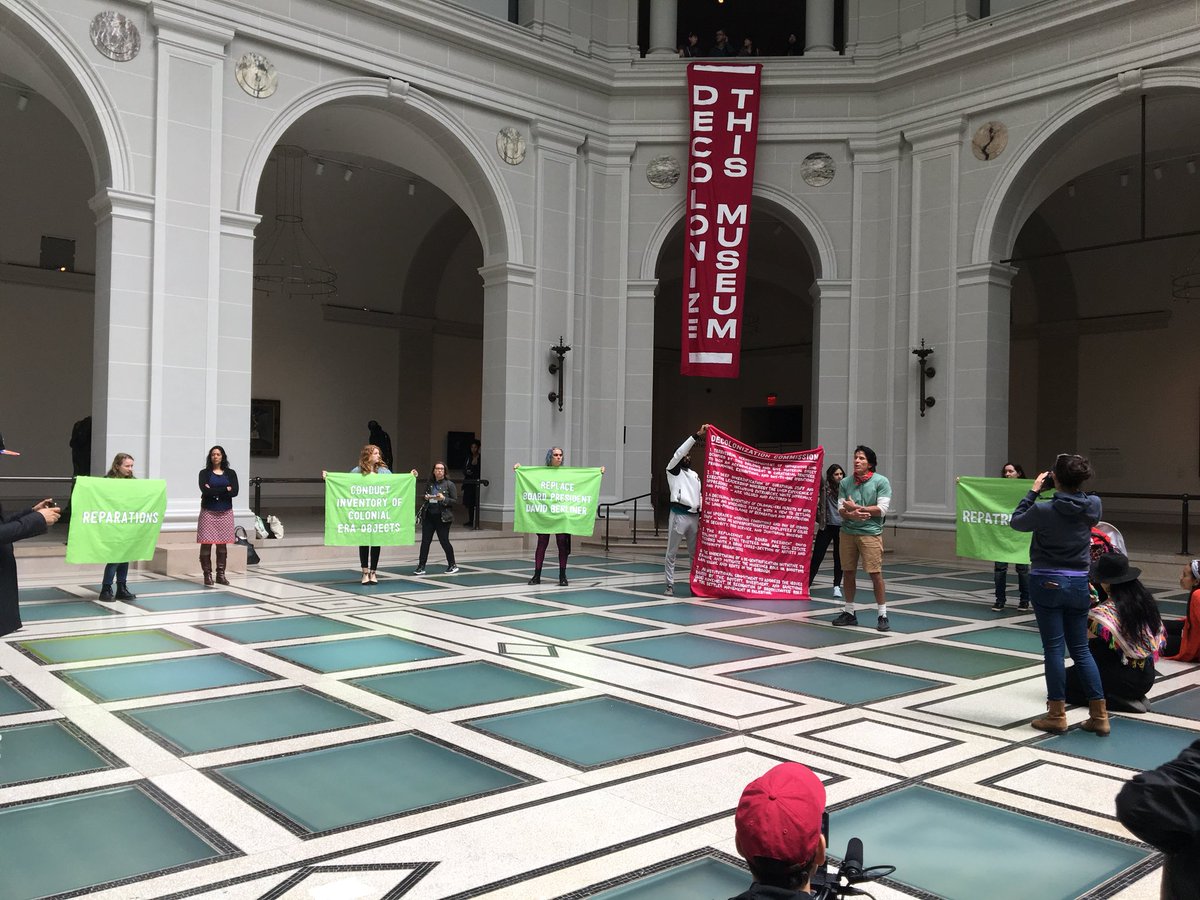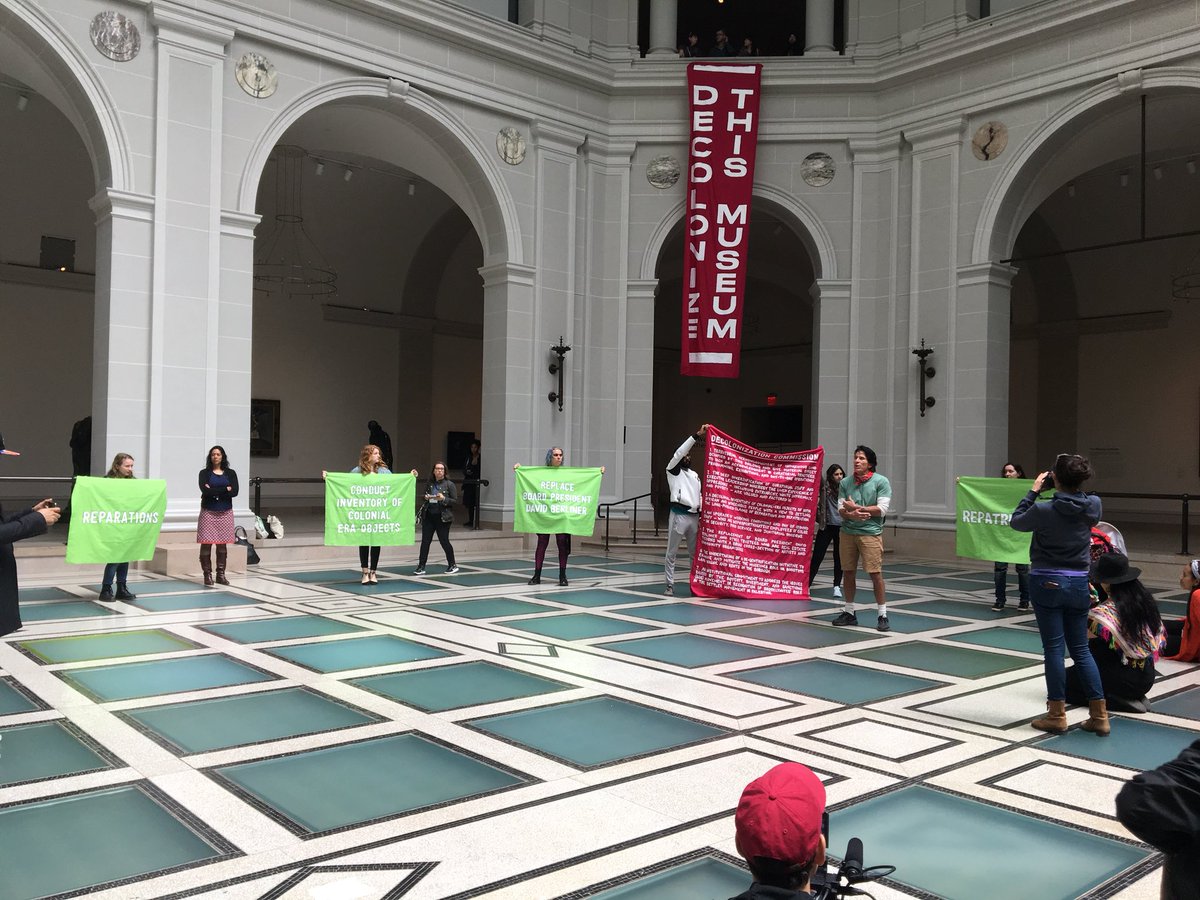[ad_1]

Protesters in the Beaux-Arts Court at the Brooklyn Museum in New York.
MARAL BABAI
“Decolonize the Brooklyn Museum!” a group of activists shouted in the lobby of the Brooklyn Museum on Sunday. Other impassioned chants followed—“repatriation!,” “reparations!,” “territorial acknowledgement!”—as part of a larger protest led by the activist group Decolonize This Place at a meeting in the New York institution’s Beaux-Arts Court. Attendees brought with them a set of demands for the museum that include the replacement of certain board members with artists and community organizers as well as an increased commitment to diversifying its curatorial staff.
The protest—which was documented comprehensively on social media—followed an open letter issued earlier this month by Decolonize This Place, an group dedicated to “indigenous struggle, black liberation, Free Palestine, global wage workers, and de-gentrification,” in response to the museum’s decision to hire a white woman, Kristen Windmuller-Luna, as its consulting curator for African art. In that letter, which was co-signed by various activist organizations, including Chinatown Art Brigade and Brooklyn Anti-Gentrification Network, the group demands that the Brooklyn Museum form a “Decolonization Commission” that would help the institution address its “role in the histories of colonialism and white supremacy.”
Anne Pasternak, the Brooklyn Museum’s director, later issued a statement in response. She agreed that the museum needs to take accountability for what was spelled out by Decolonize This Place in its missive, but noted that these issues related to diversification and gentrification were structural matters affecting a number of American museums. “Please know that every day the Brooklyn Museum is working to advance these efforts and its longstanding and widely recognized commitment to equity in all its forms, including race, class, gender, and sexual orientation,” she wrote.
The Decolonize This Place letter includes a list of seven points related to the founding of its proposed Decolonization Commission. The demands were printed on a red banner that marked yesterday’s protest, and were also printed on flyers distributed to demonstrators and museum visitors.
In an atrium space within the museum, speakers assembled to help elucidate the group’s points of protest. In front of banners unfurled from a nearby balcony—with messages reading “DECOLONIZE THIS MUSEUM” and “QUIEREN EL ARTE, NO A LA GENTE” (“THEY WANT ART, NOT THE PEOPLE”)—Shellyne Rodriguez, a member of the group Take Back the Bronx, read from a text about gentrification. “Let us be reminded that we are here to address the structural issues of this institution, understanding that these colonial practices have been at play in museums for far too long,” she said, waving her hand at the audience to drive home her point. “And this continues to be perpetuated by the recent hires of the Brooklyn Museum.” Some members of the crowd hooted and clapped. She read a quote from Helen Molesworth, the former curator of the Museum of Contemporary Art in Los Angeles, about the necessity for arts institutions to decolonize themselves—punctuated by “shoutout to Helen Molesworth.”
The artist Jive Poetic addressed the implications of the Brooklyn Museum’s choice to hire Windmuller-Luna and the roles that race plays in cultural institutions. “Colorblind to race means they had the power to color-code us,” he said. “Now they want to deny us our visibility by denying us our hue . . .”—he paused before continuing, “-manity. But we see how the color wheel spins green money for the White House here.” He spoke of “white allies gone neutral,” and he brought the Brooklyn Museum situation into conversation with events from his own life and from the national news cycle, repeating, at one point, “Black women disappear without a hashtag!”
The protest continued outside the museum, where protesters turned their attention to the Brooklyn Museum’s leadership and board. (ARTnews reached out to the Brooklyn Museum for a comment regarding yesterday’s protests but has thus far received no response.) “Brooklyn is not for sale!” protestors shouted while beating drums. Some specifically targeted Pasternak and David Berliner, a former real-estate developer who was named chief operating officer and president of the Brooklyn Museum in 2016. They chanted: “The people of Brooklyn say, ‘No, no, no!’ Anne Pasternak’s got to go, go, go. The people of Brooklyn say, ‘No, no, no!’ David Berliner’s got to go, go, go.”
[ad_2]
Source link

